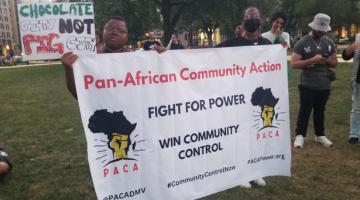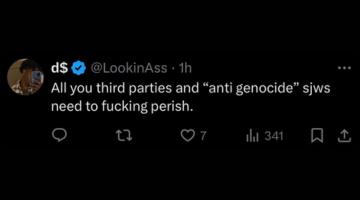As part of the Black Agenda Report Book Forum, we interview scholars about a recent article they’ve written for either an academic journal or popular publication. We ask these scholars to discuss their article, as well as some of the books that have most influenced them.
This week’s featured scholar is Calvin Warren. Warren is Associate Professor in African American Studies at Emory University. His article is “Barred Objects”.
In your article, you argue that policing is a “perverse structure”? How does this manifest itself in traditional law enforcement officers like Derek Chauvin? And what does this “perverse structure” look like in other institutions of policing? I’m thinking specifically about school teachers, physicians, social workers, and non-Black people calling the cops on Black people.
I was really interested in doing a psychoanalytic reading of police brutality because I felt that other explanations about lack of training or unconcious bias didn’t seem to really explain the dynamic that was happening. What I found really persuasive about the Lacanian analysis of perversion is that, for the pervert, part of their function is to bypass the law’s prohibition and to have direct access to enjoyment or jouissance. And by bypassing the law, ironically, the pervert believes that they are strengthening the law. It’s almost as if it is the illegal that provides the precondition for the law. And so, whereas the pervert believes the law is weak and unable to do what it really wants to do, it takes the pervert’s courage, as it were, to bypass the law and to fill this hole in the law. It offers jouissance to the law.
So it seemed to me that was a better explanation of what was happening. When we think about police brutality we often say, “It’s illegal to brutalize people. It’s illegal to violate their rights.” And yet they are not convicted. It seems as if the law kind of winks and is in collusion with it. I thought to myself, this is exactly what the pervert is doing. The pervert is bypassing the law in order to uphold the law.
So when I see acts of brutality, rather than just thinking of them as extralegal instances, I think of them as demonstrations of what direct access to enjoyment means. And what the Other as law requires of the pervert in order for the law to sustain itself. The brutality that is “extralegal” is absolutely necessary to maintain a society. And I think that’s what’s so terrible and terrifying for people – that a legal solution is always going to fail because the law actually requires this extralegal, illegal activity in order for the law to strengthen intself.
So are we going to see any legal transformations of police brutality? My argument is, according to Lacanian psychoanalysis, I don’t think that we would. And how does this manifest itself in other areas? The school-to-prison pipeline, the infant mortality rate, environmental racism – all of these things could be read rather than as violations that have legal solutions; they can be read as ways in which the law permits an exception in order to sustain itself. And this exception often takes the form of brutality against Black bodies and Black existence.
You critique some common liberal and leftist responses to policy brutality, such as claims that police officers shouldn’t be “above the law,” or they’re not respecting the “rule of law,” or that their violence is “excessive.” Yet, you write that the “outrageous violence” of policing that “often appears ‘excessive’” is not excessive at all—“It is absolutely necessary.” It reminds me of a related point you make in your book Ontological Terror: “…the ritualistic and repetitive murder of the flesh, the primordial relation, is absolutely necessary and indispensable in an antiblack world. And as long as the world exists, this murder must continue.” What, then, is required to end the world?
I might have an unpopular or contrary opinion about what the end of the world means. I’ll say it this way. For Habermasians, they have something known as the regulatory ideal. The regulatory ideal is supposed to be an ideal although it might be impossible to reach. Our attempt to move closer and closer to it regulates our behavior and our existence so that we’re moving forward. I think of the end of the world as afropessimism, Black nihilism, and some readings of Fanon would state as the inverse of that. It’s a regulatory de-ideal. The function of a regulatory de-ideal is not that the de-idealization is ever going to be accomplished. Rather, a de-idealization posits an impossibility as the only possible solution to the problem.
So in that way, the function of the end of the world as a regulatory de-ideal is to disabuse us of our humanist fantasies and our solution-problem-oriented thinking. It is to say that any enterprise – any political enterprise or ethical enterprise of freedom and justice for Blackness – is going to fail, simply because the only thing that would accomplish what it is that protestors are attempting to accomplish is something impossible. Part of our question, then, is, what is Black existence within the impossibility of any solution? And that is for me, as a nihilist, the most difficult question.
In mainstream discourses around policy brutality, it’s common to use the terms “racism” and “anti-blackness” interchangeably. But in your article, you write that “racism and anti-blackness are not identical, interchangeable, or analogous.” Can you explain why this distinction is so important for liberation struggles, and perhaps how it connects to Jared Sexton’s theorizing of “People-of-Color-Blindness”?
For me, race is a category or distinction of human difference. I think if we recall Foucault, it’s the way that humans differentiate themselves to give their existence intelligibility. Much has been written about race and philosophers of race. But for me, race is a concept that allows human form to have intelligiblity.
When we talk about anti-blackness I think very often people collapse racism – which is certain forms of violence given certain categories of race – to anti-blackness. But to understand anti-blackness we have to understand what Blackness is. For me, Blackness is not an identity. It is not a humanist concept. Blackness is a function imposed on flesh. And the function that’s imposed on flesh is to be the bearer and carrier of nothingness. And what I’ve argued is that it is Black bodies that have had to perform this function for the world. That function is not race. That function is what I call an onto-metaphysical function to the extent that what Blacks are doing for the world through their existence is absorbing the terror of nothingness that limits humanism.
So anti-blackness, then, would be the particular ways the world imposes and forces this function onto Black flesh. It’s also the way that Black flesh is continually in this dialectic between necessity and hatred. Black flesh is hated because it carries nothing and it is a hole to humanist aspirations. But it is also needed because without a certain embodiment of nothing’s domination, the metaphysical world as I understand it is limited. So in short, this is just to say the distinction between racism and anti-blackness is one of humanist human oppression and one of onto-metaphysical function. And those two are not interchangeable.
In both this article and your book Ontological Terror, you call into question the concept of Black “agency” and “will” and whether such capacities we tend to associate with them can exist in the wake of a “metaphysical holocaust.” How does this relate to your theorizing about police brutality, political protest, and what you call “our universal-humanist fantasies”?
So one of the things that I argue is what when the pervert stages their demonstration of direct access to jouissance, very often what they need is a fetish. The fetish is an object that is void of anything that matters to the pervert – void of will, void of agency – and it is pushed to the limits of extremity. It’s almost as if the pervert is in a psychic theatre. The pervert is performing for an audience. The audience is the Other. And in order for the pervert to demonstrate, “Look at me. Look what I can do. Look, I have direct access,” the pervert needs a prop. And this prop we can call a fetish. What I’ve argued is that we might need to start thinking about Blackness as a global fetish. I call it a global public trust of the fetish. And in this way, Black bodies have been conscripted in a sense to inhabit this position of the object so that law enforcement as perverts can stage their direct demonstration.
That might sound a little too Lacanian, but all of this is just to say that if we think “will” and “agency” and charming antiblackness, of reasoning with anti-blackness, of sitting down and having tea with racists, and having Obama-style kumbaya get-togethers, is going to resolve anti-blackness I think we set ourselves up for dissapointment. Anti-blackness is not something that can be resolved through reason. And anti-blackness, despite all of our efforts, cannot be overcome through the power and force of our will. I think that’s what makes anti-blackness so terrifying, especially for Blacks. It’s that the universal tools that we are told can allow us to transform our circumstances (if we put them to good use) – these tools have historically failed for Blackness. So we can either keep doing the same things over and over hoping for a different result – the insanity of politics. Or, we can understand that these tools, these universal instruments, are not going to work for Blackness.
That’s pretty much what I had in mind – to disabuse us of these fantasies that we can work our will, agency, power, and passion into making the world a better place. And better usually means equitable for Blacks. But these things only work if we do not understand the deep psychic and onto-metaphysical infrastructures of anti-blackness. Those things cannot be changed or transformed through will.
You wrote a very generous endorsement for David Marriott’s new book, Lacan Noir: Lacan and Afro-pessimism. Can you share what you find most compelling about Marriott’s reading of both Fanon and Lacan? Relatedely, what do you see as the most important contributions and limitations of psychoanalysis for Black study?
What is mot important about Marriott’s reading of Fanon is the idea of the n'est pas and for Marriott’s re-reading and return to Fanon. He thinks about Blackness as that which is without concept, which is without conceptuality. Which means that every attempt to give it meaning – every attempt to situate it within a matrix of meaning and existence – inevitably fails. And so he calls this an abyss. Thinking about Black existence as an abyss, meaning that conceptuality is an unreliable source of meaning for Blackness, is very generative for me. Black studies spends so much time trying to assign meaning to Blackness. A lot of liberal discourse assumes that if we can just transmit Black meaning better to whiteness, then somehow we’ll be free.
I think about the semiotic dessimation that there isn’t any sign that can hold Blackness in all of its terror and weight. For me, it means that we have to demolish all of these meaning-making enterprises and begin anew. This is a different understanding of tabula rasa in terms of its academic instantiation. To talk about Blackness as tabula rasa is not to talk about Blackness as infinitely “the sky’s the limit” or “Blacks can do anything.” It is to say that you are starting with an abyss without conceptuality. It is a blank slate, literally.
If Black studiess, and Black thought in particular, start from this point, how would that change the trajectory of our thinking? What would we have to discard in our noetic enterprises in order to remain in that abyss or to remain true to the abyss that we inhabit? That’s an exceptionally generative idea and I just hope that Black studies picks it up.
As for Lacan, what was most generative was Marriott’s idea that the sign is already colonized by negrophobia. In the analytic session, what is traded are signs. And the analyst is reading the speech of the analysand in hopes of finding a disruptive moment that would provide us access to the the knowledge of the unconscious. But within the Lacanian and Freudian approach there is a truer language – let’s call it the language that emanates the disruption from the knowledge of the unconscious – that would provide an opportunity for a traversal of certain fundamental fantasies.
Marriott’s intervention is that there isn’t an escape from negrophobia. The unconscious as well as egoic speech are thoroughly negrophobic and colonized by anti-blackness. So for me it means: What would a Lacanian psychoanlaysis mean for Blackness if all sides and all emergences of the sign are already negrophobic? And if that’s the case, what do we do with the talking cure? I really think his return to Fanon’s therapeutics and sociogeny as a way of perhaps thinking about a different protocol for analyizing the psychic life of Blackness is really generative. I think Marriott’s book, more than anything I’ve ever read, opens the door for that. It invites us to consider language anew. And it invites us to consider the hope that we place in language, in the talking cure. And if we cannot place that hope in language, how do we attend to the trauma of anti-blackness?
A lot of organizers, artists, and academics can often point to books that helped radicalize them. Are there any books that radicalized you? How so?
I don’t necessarily believe in revolutionary politics. But I think I get the gist of what you’re saying: What has disrupted my way of thinking that has led to something else? I would say Saidiya Hartman’s Scenes of Subjection was really the first time that I read a book that so thoroughly and devastatingly disabused me of these liberal hopes and aspirations. This double bind of freedom – that freedom is another form of enslavement, that empathy is another form of violence. I think Scenes of Subjection really devastated all of these formulations that circulate within Black humanism and in liberalism in general. And after reading that – and I still read it to this day, I teach it every opportunity I get – I think the reaction, even twenty years or so after it’s written, students are still devastated by it. To me it’s the mark of an event, a theoretical event.
Which two books published (or read) in the last five years would you recommend to BAR readers? How do you envision engaging these works in your future scholarship?
One book that has really helped me is Jean-Luc Marion’s God Without Being. It really provided me with a way of thinking about God and theology differently. It really exposed to me how imbricated ontology and theology are. Especially Black theology. It’s strange because when I read Black theology, being is almost like it’s divine. And I think, why? It was Marion’s book that allowed me to try to separate the two.
The last text is Christina Sharpe’s In the Wake. For me what’s most generative and important about that book is the idea of Black care. Especially if we think about the n'est pas. How do you care for n'est pas? What does care entail without conceptuality? What kind of practices of care can address the deep spiritual and metaphysical traumas of anti-blackness? So although the book doesn’t go through all that I think it certainly is an invitation to think about care in its magnitude. It’s also to invite us to think about the way that Blacks have organized themselves around practices of endurance that still require further consideration.
Roberto Sirvent is editor of the Black Agenda Report Book Forum.



















